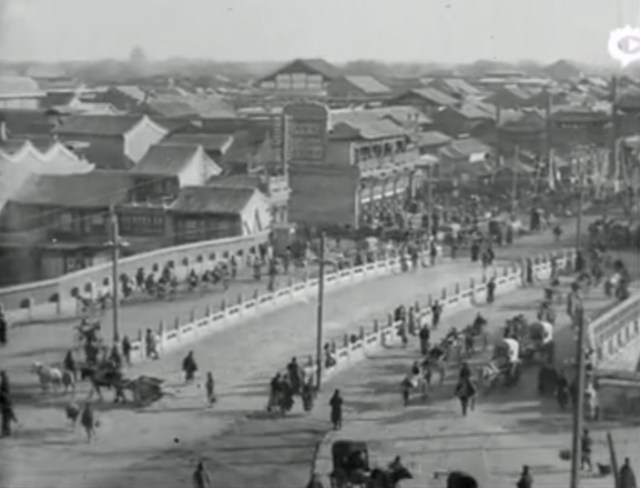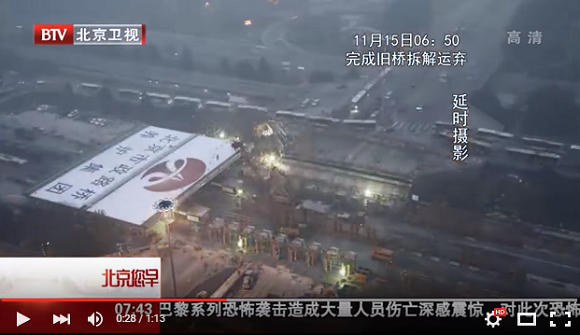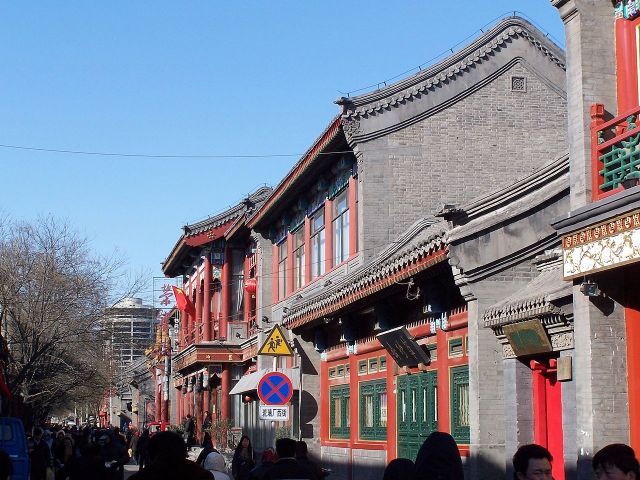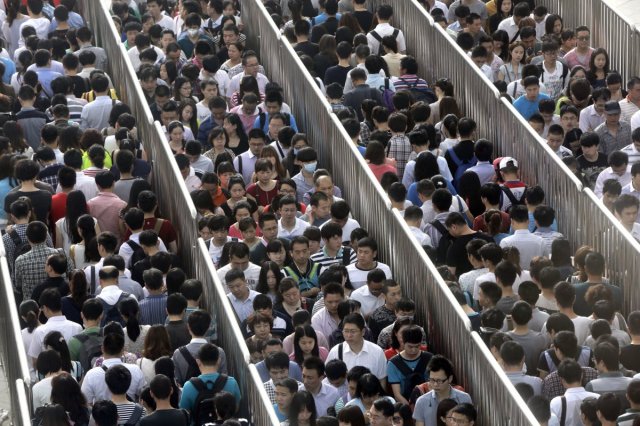This would have been supremely cool if it wasn’t for the fact that it would also cause chaos on roads.
beijing
Yet another example of how tigers shamelessly show no regard for the personal property of others.
The world’s first elevated bus that glides over the top of moving cars began its first test run today in Hebei province, China.
What did China’s capital look like before everyone had a camera in their pocket? This rare historical footage gives us all a unique look at Beijing just under a century ago.
In a lot of major cities around the world, people are hesitant to get involved when they see an injured person. After all, if movies have taught us one thing, it’s that the people who go to check on the fallen hero are often the first to get picked off by a terminator or Mike Myers in hot pursuit.
At best stopping to assist someone with a wound will likely set you off on a journey that Peter Travers of Rolling Stone calls “an rip-roaring, edge-of-your-seat adventure” and seriously, who has time for all that?
That might be why Good Samaritans are hard to come by in big cities everywhere, and in Beijing the government is looking to change that by offering protections in what is casually being referred to as the Good Person Protection Ordinance. However, rather than killbots and monsters, this measure will protect helpful souls from a much more real threat.
As reported by China Youth Daily and Shanghaiist, during another typical day in Beijing, a woman whipped off her bra and handed it to a man in public. Wait, what??
You might think that this kind of erratic behavior means she was participating in some kind of women’s rights demonstration, or felt like getting a super early head start protesting the next World Cup like these other Chinese women did earlier this summer. But actually, the real purpose for her ‘liberation’ was for a completely unrelated reason–to prove that she was indeed the owner of a luxury item.
Beijing’s subway network is the busiest in the world, with commuters taking about 10 million rides a day throughout nearly 200 subway stations.
These commuters, who already deal with massive traffic jams, overcrowded public transportation, and air so filthy that biking or even walking to work is often not an option, are experiencing a new obstacle: airport-style security at major subway stations.
On Saturday, Beijing tightened security checks at subway stations following an attack in China’s troubled Xinjiang region which killed 31 people.
Here are photos from this morning’s massive lines during rush hour at Beijing’s Tiantongyuan North Station.
Every protest movement draws inspiration from the incubating culture and the desired message. Brazilians have incorporated soccer balls into their recent protests against the cost of holding the World Cup and a lack of public services. Last year, French dairy farmers protested the slumping price of milk by dumping 3.5 million liters of milk near the iconic Mont Saint-Michel. So what are we to make of the recent rise in streaking as social protest in China?
For young and middle-aged women in China who just want to live freely without being hounded by their parents to marry, renting a boyfriend for a day could be the perfect answer! Japanese news site, Nikkei, recently sat down with 27-year-old financial businessman and volunteer boyfriend, Wang Zhuo, for an interview regarding his 100 plus “girlfriends” over the past two years. Could it be that for whatever reason China’s women are becoming increasingly dependent on rental boyfriends? We’ve seen how it works for lonely ladies in Japan! What sort of insights has Wang gained into these Chinese women’s desires… Read More
According to Hong Kong dailies dated May 11, university officials in Beijing and Shanghai were reported as saying authorities had directed them to refrain from teaching seven subjects in their classes including “freedom of the press,” “human rights” and “universal values.”
Read More
According to the April 2 edition of Chinese daily newspaper the 21st Century Business Herald, in the year 2010 an incredible 1.23 million people lost their lives across China due to air pollution-related illnesses. The number accounts for 15 percent of total deaths recorded in the country for 2010. The information was revealed by a study group at Tsinghua University on March 31.
Read More
Recent reports from Radio France Internationale (RFI)’s Chinese site suggest that China’s pollution problem is raising serious concerns within the country itself. In the push for economic growth, the China is also becoming increasingly aware of what could potentially develop into a serious problem if steps are not taken soon. In this connection, there has been heated debate on the Internet suggesting that Chinese authorities are proposing moving the capital away from Beijing.










 Starbucks Japan unveils new sakura cherry blossom collection for hanami season 2026
Starbucks Japan unveils new sakura cherry blossom collection for hanami season 2026 Is Tokyo Station’s startlingly expensive wagyu bento boxed lunch worth its high price?[Taste test]
Is Tokyo Station’s startlingly expensive wagyu bento boxed lunch worth its high price?[Taste test] Sakuramochi festival sweetens things up at Tokyo’s Seibu Ikebukuro this season
Sakuramochi festival sweetens things up at Tokyo’s Seibu Ikebukuro this season Kyoto raises hotel accommodation tax to fight overtourism, travelers could pay up to 10 times more
Kyoto raises hotel accommodation tax to fight overtourism, travelers could pay up to 10 times more Sakura Festival in Chiyoda mixes illuminations, boats, music, and Rilakkuma in the heart of Tokyo
Sakura Festival in Chiyoda mixes illuminations, boats, music, and Rilakkuma in the heart of Tokyo Zelda isn’t the Nintendo anime adaptation Japanese fans want to see most, survey says
Zelda isn’t the Nintendo anime adaptation Japanese fans want to see most, survey says Japan would like to remind you that “emoji” has nothing to do with “emotion”
Japan would like to remind you that “emoji” has nothing to do with “emotion” Survey reveals the most popular time to slip into a yukata at a traditional Japanese inn
Survey reveals the most popular time to slip into a yukata at a traditional Japanese inn Starbucks Japan releases first-ever Hinamatsuri Girls’ Day Frappuccino
Starbucks Japan releases first-ever Hinamatsuri Girls’ Day Frappuccino Jamiroquai doll from Japan lets you control your own Virtual Insanity 【Video】
Jamiroquai doll from Japan lets you control your own Virtual Insanity 【Video】 Japanese restaurant chain serves Dragon Ball donuts and Senzu Beans this spring
Japanese restaurant chain serves Dragon Ball donuts and Senzu Beans this spring Japan Extreme Budget Travel! A trip from Tokyo to Izumo for just 30,000 yen [Part 1]
Japan Extreme Budget Travel! A trip from Tokyo to Izumo for just 30,000 yen [Part 1] Highest Starbucks in Japan set to open this spring in the Tokyo sky
Highest Starbucks in Japan set to open this spring in the Tokyo sky Japan’s craziest burger chain takes menchi katsu to new extreme levels
Japan’s craziest burger chain takes menchi katsu to new extreme levels Japan Extreme Budget Travel! A trip from Tokyo to Izumo for just 30,000 yen [Part 2]
Japan Extreme Budget Travel! A trip from Tokyo to Izumo for just 30,000 yen [Part 2] Japan has only one airport named after a samurai, so let’s check out Kochi Ryoma【Photos】
Japan has only one airport named after a samurai, so let’s check out Kochi Ryoma【Photos】 Japanese drugstore sells onigiri at pre-stupid era prices, but how do they compare to 7-Eleven?
Japanese drugstore sells onigiri at pre-stupid era prices, but how do they compare to 7-Eleven? Viral Japanese cheesecake from Osaka has a lesser known rival called Aunt Wanda
Viral Japanese cheesecake from Osaka has a lesser known rival called Aunt Wanda Which convenience store onigiri rice balls are the most popular? Survey reveals surprising results
Which convenience store onigiri rice balls are the most popular? Survey reveals surprising results Japan’s newest Shinkansen has no seats…or passengers [Video]
Japan’s newest Shinkansen has no seats…or passengers [Video] Starbucks Japan releases new sakura goods and drinkware for cherry blossom season 2026
Starbucks Japan releases new sakura goods and drinkware for cherry blossom season 2026 Foreigners accounting for over 80 percent of off-course skiers needing rescue in Japan’s Hokkaido
Foreigners accounting for over 80 percent of off-course skiers needing rescue in Japan’s Hokkaido Super-salty pizza sends six kids to the hospital in Japan, linguistics blamed
Super-salty pizza sends six kids to the hospital in Japan, linguistics blamed Starbucks Japan unveils new sakura Frappuccino for cherry blossom season 2026
Starbucks Japan unveils new sakura Frappuccino for cherry blossom season 2026 Foreign tourists in Japan will get free Shinkansen tickets to promote regional tourism
Foreign tourists in Japan will get free Shinkansen tickets to promote regional tourism The 10 most annoying things foreign tourists do on Japanese trains, according to locals
The 10 most annoying things foreign tourists do on Japanese trains, according to locals Take a trip to Japan’s Dododo Land, the most irritating place on Earth
Take a trip to Japan’s Dododo Land, the most irritating place on Earth Naruto and Converse team up for new line of shinobi sneakers[Photos]
Naruto and Converse team up for new line of shinobi sneakers[Photos] Is China’s don’t-go-to-Japan warning affecting the lines at a popular Tokyo gyukatsu restaurant?
Is China’s don’t-go-to-Japan warning affecting the lines at a popular Tokyo gyukatsu restaurant? Survey asks foreign tourists what bothered them in Japan, more than half gave same answer
Survey asks foreign tourists what bothered them in Japan, more than half gave same answer Japan’s human washing machines will go on sale to general public, demos to be held in Tokyo
Japan’s human washing machines will go on sale to general public, demos to be held in Tokyo Starbucks Japan releases new drinkware and goods for Valentine’s Day
Starbucks Japan releases new drinkware and goods for Valentine’s Day We deeply regret going into this tunnel on our walk in the mountains of Japan
We deeply regret going into this tunnel on our walk in the mountains of Japan Studio Ghibli releases Kodama forest spirits from Princess Mononoke to light up your home
Studio Ghibli releases Kodama forest spirits from Princess Mononoke to light up your home Major Japanese hotel chain says reservations via overseas booking sites may not be valid
Major Japanese hotel chain says reservations via overseas booking sites may not be valid Put sesame oil in your coffee? Japanese maker says it’s the best way to start your day【Taste test】
Put sesame oil in your coffee? Japanese maker says it’s the best way to start your day【Taste test】 No more using real katana for tourism activities, Japan’s National Police Agency says
No more using real katana for tourism activities, Japan’s National Police Agency says Zelda isn’t the Nintendo anime adaptation Japanese fans want to see most, survey says
Zelda isn’t the Nintendo anime adaptation Japanese fans want to see most, survey says Japan would like to remind you that “emoji” has nothing to do with “emotion”
Japan would like to remind you that “emoji” has nothing to do with “emotion” Survey reveals the most popular time to slip into a yukata at a traditional Japanese inn
Survey reveals the most popular time to slip into a yukata at a traditional Japanese inn Starbucks Japan releases first-ever Hinamatsuri Girls’ Day Frappuccino
Starbucks Japan releases first-ever Hinamatsuri Girls’ Day Frappuccino Jamiroquai doll from Japan lets you control your own Virtual Insanity 【Video】
Jamiroquai doll from Japan lets you control your own Virtual Insanity 【Video】 Coronavirus changes how Tokyo shrine handles centuries’ old purification process for visitors
Coronavirus changes how Tokyo shrine handles centuries’ old purification process for visitors Smallest hotel room in Tokyo? This cheap stay for two will turn friends into lovers
Smallest hotel room in Tokyo? This cheap stay for two will turn friends into lovers Our writer of Korean descent weighs in on using Korean names in Japan
Our writer of Korean descent weighs in on using Korean names in Japan Starbucks Japan’s first pineapple Frappuccino, Go Pineapple, should be the Gorogoro Pineapple
Starbucks Japan’s first pineapple Frappuccino, Go Pineapple, should be the Gorogoro Pineapple When life doesn’t give you expensive tuna, build a tuna fishing vessel plastic model instead
When life doesn’t give you expensive tuna, build a tuna fishing vessel plastic model instead That time we were either genius or insane to eat natto with Yukimi Daifuku per official advice
That time we were either genius or insane to eat natto with Yukimi Daifuku per official advice Keisuke Honda’s award-winning fragrance leaves some wondering if his head is still in the game
Keisuke Honda’s award-winning fragrance leaves some wondering if his head is still in the game